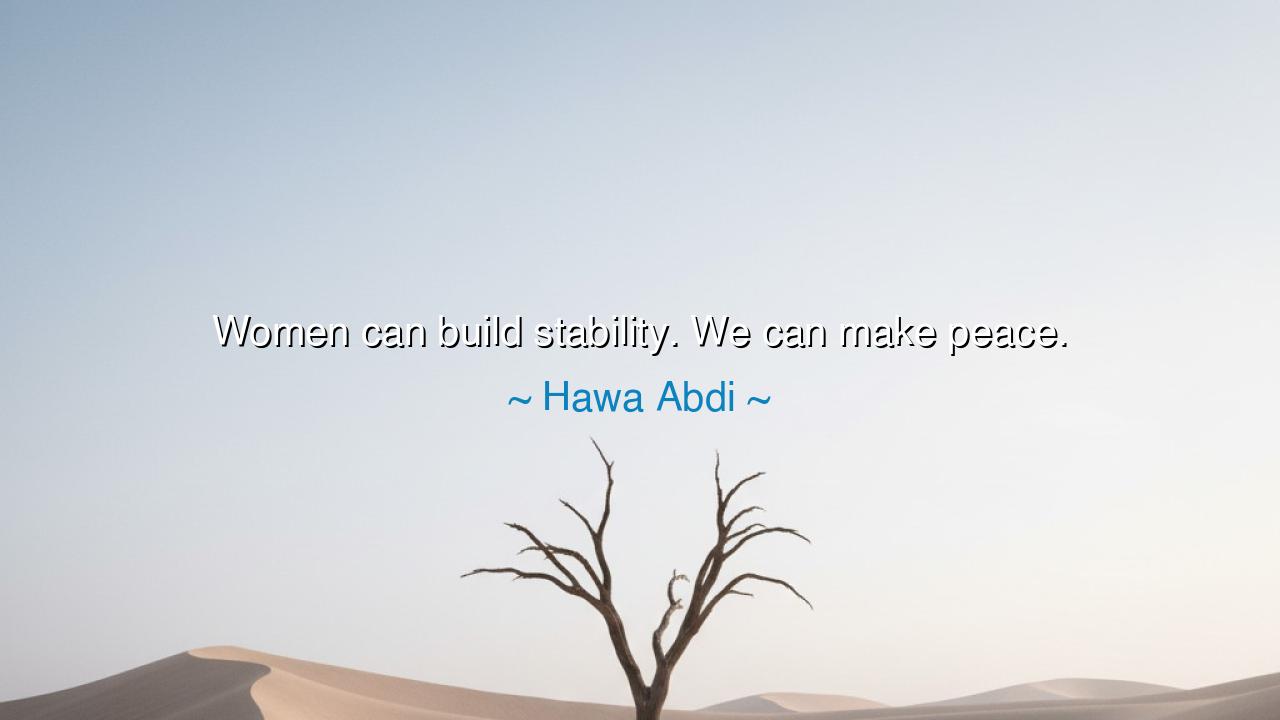
Women can build stability. We can make peace.






The words of Hawa Abdi resound like a sacred proclamation: “Women can build stability. We can make peace.” In them we hear not only the voice of a Somali doctor, lawyer, and humanitarian, but also the voice of generations of women whose labor, often hidden, has held the world together through storms of war and hunger. Her words are both humble and heroic, for she does not claim conquest, nor demand dominion, but declares the power of women to weave stability where chaos reigns, and to craft peace where hatred breeds. This is not the fragile peace of silence, but the enduring peace that springs from compassion, endurance, and the courage to nurture life itself.
To understand the origin of these words, one must see the world from which Abdi spoke. Somalia, her homeland, was torn by civil war, famine, and the collapse of institutions. Amidst destruction, many fled or surrendered to despair. But Hawa Abdi turned her land into a refuge, sheltering tens of thousands of displaced people, most of them women and children. She showed through her deeds that women are not merely victims of conflict but are often the builders of what survives it. Where bullets tore the earth, she planted seeds of hope; where men waged war, women, under her guidance, kept life moving forward—feeding, healing, teaching, and reconciling. Her life itself was the living scripture of her declaration.
History, too, bears witness to this truth. When the Second World War consumed Europe, it was often women who sustained the fragile order at home—working in fields and factories, raising children amidst ruins, and preserving the rhythms of daily life. Though their stories are less sung, their endurance was the bridge between collapse and recovery. Likewise, in Rwanda after the genocide of 1994, it was women who rose from unspeakable horror to lead reconciliation efforts, rebuilding trust in shattered communities. Again and again, when destruction tears apart the fabric of nations, women step forth as the weavers of stability, binding together what violence sought to unravel.
Why is this so? Because the power of women lies not in force, but in the strength of continuity. To build stability is to guard the hearth, to keep alive the flame of daily life when all else falls apart. And to make peace is to choose dialogue over revenge, reconciliation over endless cycles of hate. Women, so often tasked with sustaining families, bring into the public square the same instincts that preserve the household: to nourish, to protect, to mend. Abdi’s words echo the wisdom of the ancients—that the feminine principle is not weakness, but the very force that restores balance to a world in turmoil.
But let us not mistake her teaching for passivity. To make peace is an act of courage, sometimes greater than the act of war. Hawa Abdi faced threats, soldiers, and even those who sought to seize her land by force. Yet she stood her ground, declaring that her refuge was not for conquest but for life. Here is the paradox revealed: true peace is not the absence of conflict, but the resistance to despair. Women like Abdi show that peace is an active force, forged daily through sacrifice, persistence, and the unyielding refusal to abandon hope.
The lesson is luminous: if we desire a future free of endless violence, we must uplift the role of women in building societies. We must honor their voices in councils of decision, their hands in the work of recovery, their wisdom in the shaping of nations. Each of us, in our homes and communities, must learn from their example: to be stabilizers in times of upheaval, to be peacemakers in times of rage. Even in our daily lives, we can practice this teaching—by seeking reconciliation in conflict, by caring for the vulnerable, and by guarding the fragile structures of trust that sustain human bonds.
Therefore, let these words echo in your hearts: “Women can build stability. We can make peace.” Remember that peace is not crafted in palaces, nor stability secured only by armies, but both are born in the courage of ordinary lives, especially in the hearts of women who refuse to yield to the darkness. Honor them, emulate them, and walk in their footsteps, so that you too may be counted among the builders of stability and the makers of peace.
–––






AAdministratorAdministrator
Welcome, honored guests. Please leave a comment, we will respond soon